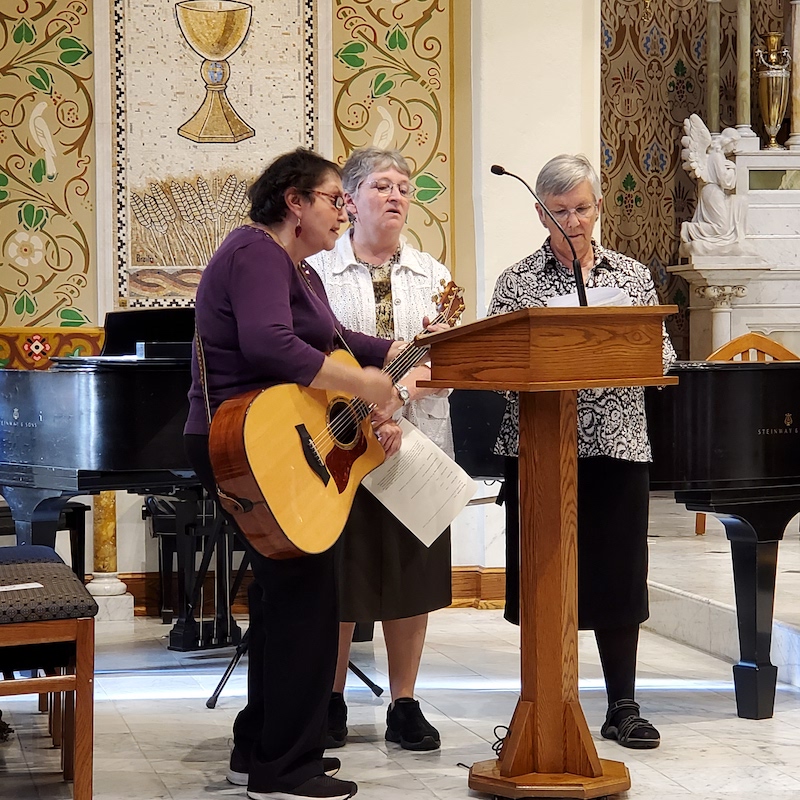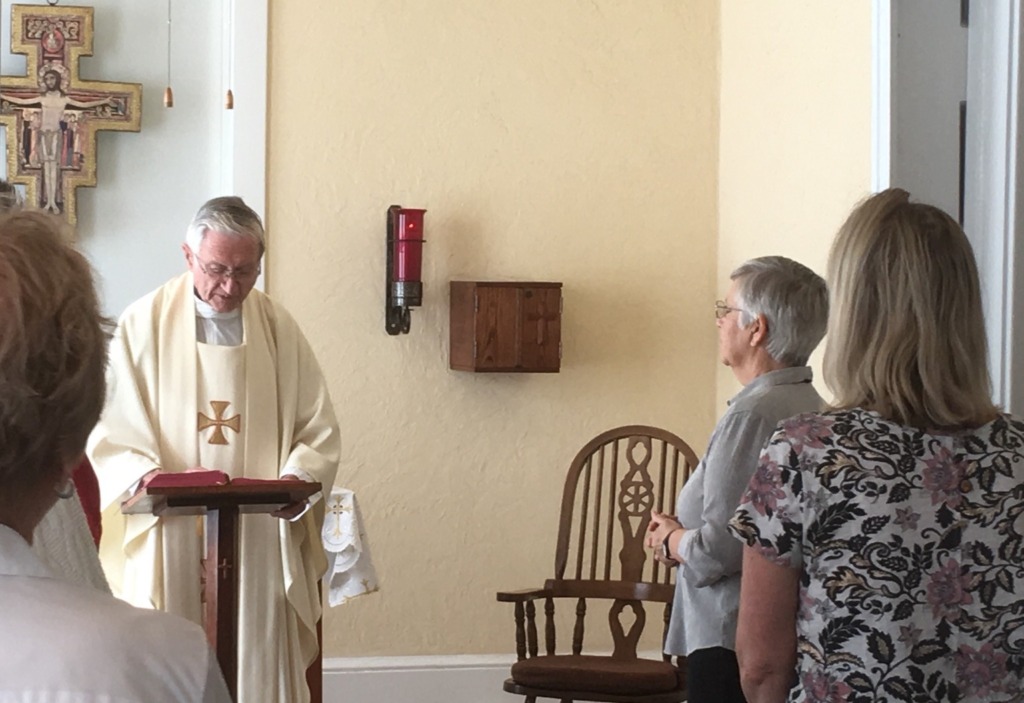Roanoke’s Madonna House part of worldwide outreach to the poor
When Catherine de Hueck Doherty founded Madonna House, a house of prayer and service in the wilderness of Combermere, Ontario, on May 17, 1947, she may not have expected it to grow into a worldwide ministry. A Russian-Canadian Catholic social worker and activist, Doherty established a simple rural apostolate that includes more than 200 consecrated single laywomen and laymen, as well as some priests, who live together in community to serve the poor in 18 locations worldwide.
One of those sites is in Roanoke, in an old brick house that stands in the heart of the city and which once served as the convent for Our Lady of Nazareth Parish.
On Tuesday, May 17, in conjunction with the 75th anniversary of Madonna House’s founding in Canada, St. Andrew, Roanoke, celebrated a special Mass and reception to honor the work of local Madonna House residents who serve and live among the urban poor, offering a house of listening, hospitality and prayer.
“The laity are called there by God and are led by the spirit of the Gospel,” said Father Kevin Segerblom, St. Andrew’s pastor, in his homily. “They work from within as a leaven. Their work bears fruit in many ways.” He cited several Madonna House guidelines, the first of which is: “Everyone is called to holiness in everyday life.”
Madonna House member Marie Therese McLaughlin urged those gathered for the celebration: “Let’s all be leaven, so we can raise up the world.”
She was joined during the Mass by the two other women who live with her in the Roanoke house. Anne Marie Murphy sang with her in harmony and Viva LeBlanc read from Romans 12:1-13, which included these words: “Rejoice in hope . . . persevere in prayer. Contribute to the needs of the holy ones. Exercise hospitality.”
The Mass, concelebrated by area clergy, was followed by a public reception in the social hall. The gathering was a joyful example of another Madonna House guideline: to live in widespread communion with others as a family.
“I see Catholics and non-Catholics alike here, from many different local churches,” McLaughlin said.
121 years combined service
Madonna House is “a Catholic community of men, women and priests, dedicated to loving and serving Jesus Christ in all aspects of daily life,” as stated by the “mother house” in Ontario. The 18 “field houses” are found in Canada, the U.S., England, Belgium, Grenada and Russia, which Doherty fled in 1919. Each is different, ranging from rural farms to urban soup kitchens, and each has its own mandate.

The mandate for the Roanoke house originally was “to insure a prayer presence in the diocese,” as written by the late Bishop Walter F. Sullivan in 1979. Updated by Bishop Barry C. Knestout in 2019, it now is also to proclaim the Gospel and practice the spiritual and corporal works of mercy, as well as to be generous to all who visit, “especially anyone needing a listening ear to discern the signs of God in our midst.”
The Roanoke location has had only women since it opened. The three current residents – McLaughlin, Murphy and LeBlanc – together have served for 121 years.
All Madonna House members take a vow of poverty, chastity and obedience, and wear large silver crosses bearing the words “Pax” and “Caritas” (“peace” and “charity”). They depend entirely upon donations and go wherever the motherhouse assigns them, staying months or years before being moved to another location.
“We just pack our two suitcases and go,” McLaughlin said with a smile.
She comes from a Canadian family with 10 children and assumed she would marry and raise a family herself. But after completing her university studies in 1974, a priest approached her after Mass one day and told her she was being called to contemplative life. She kept her plan to teach high school English, French and religion in Newfoundland for a year, then visited Combermere.
“I saw the Gospel lived there,” she said. “I asked Catherine Doherty if I should join, and she said yes.”
McLaughlin went to the chapel and prayed for a sign.
“And that same priest showed up there, and he remembered me and what he had told me a year before,” she said.
She soon began her journey to joining, and after the required period of discernment, took her final “promises” in 1976.
Murphy, from New Brunswick, Canada, joined in 1984. She was working in medical research in 1981 in Nova Scotia when she felt called to a different life, and, after visiting Madonna House, knew that was her path.
“Catherine Doherty’s idea that you can pray through whatever you are doing in daily life, like doing the laundry — that was new to me,” she said. “And I loved the commitment to serving the poor.”
LeBlanc, a former social worker and educator from Louisiana, joined in 1988. She was studying evangelization at St. Mary’s in North Dakota when she heard about “Madonna House on the prairie,” at a location in Saskatchewan.
She visited the motherhouse and was drawn to that life but returned to her studies. Yet, when her spiritual director asked her how she felt about Madonna House, she surprised herself with her reply: “It’s an immense treasure.”
“As soon as I said that, I knew I was meant to stay,” she said.
Guided by the Blessed Mother
Gardens on site provide fresh produce for many of the houses, and there is a farm in Combermere. In Roanoke, a statue of the Blessed Mother also stands among the backyard garden beds, within a small wooden shrine made by a local Catholic friend and encircled by flowers.
Each Madonna House building has a blue front door, in honor of the Blessed Mother.
“We are named for the Mother of God, whose presence permeates all our actions,” McLaughlin explained. “Anyone that comes through the blue door gets a blessing from Our Lady.”
No two days are alike at Madonna House in Roanoke. The residents attend daily Mass together at one of several local Catholic churches, and on two Saturdays each month, Mass is celebrated at their own in-house chapel by a rotation of local priests and followed by a potluck brunch for those who attend.
They eat all of their meals together, pray throughout the day and sing; tend to the house and grounds; and greet whoever comes through their blue door — friends and strangers alike.
“People need to talk and pray and have someone listen to them,” said McLaughlin, who is trained in spiritual direction.
The house also offers two public rooms for “poustinia” (which means “desert” in Russian) – retreat spaces for prayer and contemplation.
‘Consumed by our love of God’
For more than three years, Our Lady of Nazareth parishioner Jerry Guzi has regularly brought roses to Madonna House.
“This place blesses everyone who comes here,” he said.
In February 2019, he felt compelled one day to bring a vase of roses and leave them on the front porch by the blue door. A few days later, he received a thank-you note from resident Ana Sofia Corona Gaxiola, who told him that on that same day, she had just completed a novena to St. Therese of Lisieux.
“She is famous for sending roses as a sign of favor for her intercession,” she wrote.
Guzi has brought roses for each Mass ever since.
He added that the books sold at Madonna House, including the myriad published writings of the founder, are an ongoing blessing.
“I have a book of Catherine Doherty’s that I read every day,” he said.
The apostolate also sells other items that reflect and support their ministry, such as handmade note cards and CD recordings of their own singing.
“We are used to singing; we sing vespers together in harmony,” said McLaughlin.
“It’s part of our communal prayer and our life,” explained Murphy. “You have to learn to sing together.”
At the end of the anniversary Mass, the three invited attendees to sing with them, a capella, “Our Lady of Combermere,” in honor of the founding 75 years ago.
“On this anniversary, people are singing this song all over the world, even in Russia,” McLaughlin said. “Catherine Doherty lit a fire in us. Let us all allow ourselves to be consumed by our love of God.”

